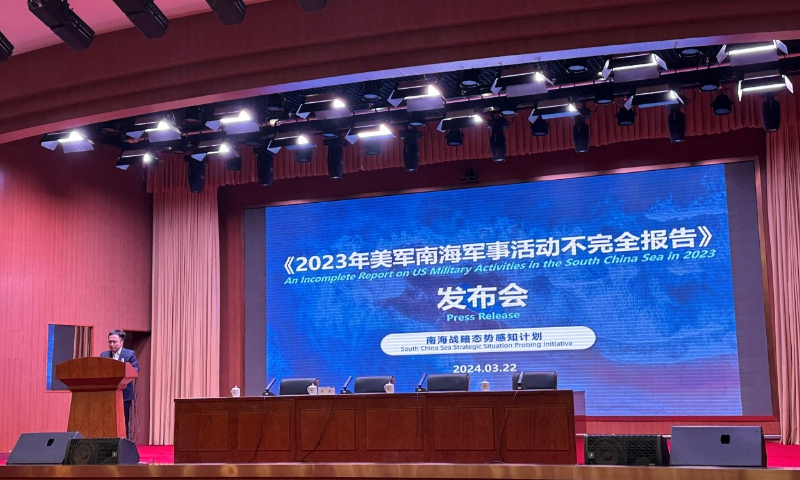The US will likely increase military presence in S.China Sea during upcoming elections: analysts

The press release of An Incomplete Report on US Military Activities in the South China Sea in 2023 by the South China Sea Strategic Situation Probing Initiative is held in Beijing on March 21. Photo: Wang Zixuan/GT
The politicization of US military operations is further strengthened, and the joint operations of allies are significantly enhanced, according to the latest report on US military activities in the South China Sea (SCS) released by the Beijing-based think tank South China Sea Strategic Situation Probing Initiative (SCSPI) on Friday. The analysis suggests that there might be a proxy in the region, but it is unlikely that a proxy war will occur.
The presence and activities of the US military are significant variables in the situation in the SCS. In February of last year, the US and the Philippines added another four bases under the EDCA, in addition to the five bases identified in 2014. The SCSPI report pointed out that the traditional EDCA military bases are mostly air force bases, while the locations of the new bases focus on the needs of the US Navy and Marine Corps. Moreover, three of the four new bases are situated close to the island of Taiwan. The US' attempt to strengthen its military deployment around the Taiwan Straits by exploiting the SCS issue and the Philippines couldn't be clearer.
"The US' actions, including deeper military cooperation with the Philippines, indeed strategically pose a threat and pressure to China," said Hu Bo, director of SCSPI, during the press release of the report.
In response to Philippine provocations against China in the SCS, the US Department of State, according to the report, issued a total of seven statements to express US support for the Philippines in the region. During Philippine President Ferdinand Marcos Jr's visit to the US, President Joe Biden stated that the US commitment to the defense of its ally is "ironclad." So, what exactly is the role of US military operations in the SCS issue? Is the US commitment truly ironclad?
Hu believes that the US is supporting the Philippines with restraint. Once the Philippine policy is not in line with US interests, the US will certainly call a halt. On one hand, the US hopes to leverage the Philippines' geographical location for its strategic positioning in the South China Sea. On the other hand, the US does not want the situation to be out of control. Although some US officials have frequently threatened to invoke the US-Philippines Mutual Defense Treaty, the report highlights that the US generally tries to maintain ambiguity regarding relevant provisions, categorizing acts such as water cannons as unarmed attacks.
"The US, in fact, intends to shape diplomatic and public opinion influence through military activities. The ultimate purpose of the US' military policy toward China is deterrence. The US doesn't want to engage in combat, and the Philippines dares not to fight. Thus far, the Philippines is actually challenging China in a gray area - a combination of military, diplomacy, international law, and public opinion, rather than direct armed conflict. Therefore, these military moves do not have much impact on China at the moment," Hu added.
Moreover, China and the US held consultations on maritime affairs in November last year, during which the two sides emphasized the necessity to manage and control maritime situations. "It is believed that China and the US will have more consultations on the SCS issue and other maritime affairs. The crisis will be under control with this consultation platform," said Lei Xiaolu, vice director of SCSPI.
From this point of view, there might be a proxy in the SCS, but it is unlikely that a proxy war will occur. This is because the US is the only country that has the ability and intention to pose a major threat to China in the region; the situation will be one-sided in the event of a proxy war unless the US joins in. On this basis, there is still a limit to the SCS situation despite the ongoing friction.
Looking ahead, Hu believes that the US will likely further increase its military presence in the SCS during the general elections in order to achieve its diplomatic and political objectives. Similarly, the Philippines will continue to stir up friction with China. However, he stressed that we should not be pessimistic about escalation, as it will not have a significant impact.
